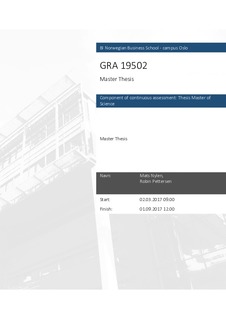Which valuation method yields the most accurate value in the valuation of companies in different stages of their life cycle?
Master thesis
Permanent lenke
http://hdl.handle.net/11250/2478122Utgivelsesdato
2017Metadata
Vis full innførselSamlinger
- Master of Science [1622]
Sammendrag
This thesis investigates how different valuation techniques - the DCF, the First
Chicago Method, and option valuation - perform on companies at different stages
in their life cycle. We compare the results of each of these valuation techniques on
three groups of companies: startups and young companies; high-growth firms; and
steady-state companies.
We have used Excel to create models for each of the valuation methods, meaning
that a number of assumptions had to be made. The assumptions include, for
instance, a benchmark for probabilities in the First Chicago Method, how to
forecast the financial statements, and how to obtain reasonable discount rate and
volatilities. Also, we compare our values to the true values, that is, the acquisition
price or the enterprise values of publicly traded companies.
By comparing the yielded values to the true values, we find that the standard
discounted cash flow method is the most accurate method when considering the
sample as a whole. However, the First Chicago Method is way more accurate than
the DCF when separating the group of startups and young companies, with an
average error of 0.95% and 18.10%, respectively. Option valuation, on the other
hand, is the least accurate for all the groups of companies. Still, we find it to yield
more accurate values when the debt ratio is low, which coincides with it
performing worst on the steady-state companies.
Beskrivelse
Masteroppgave(MSc) in Master of Science in Business, Finance - Handelshøyskolen BI, 2017
